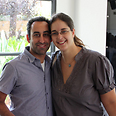
1 in 5 Israelis gets married abroad
According to Israel's Central Bureau of Statistics, 20% of Jews who got married in 2010 did so overseas. 'Rabbinate's approach to converted Jews, women is appalling,' says couple who wed in Prague
Amit Mautner, 34, and Naama Melchior, 26, tied the knot in Cyprus, after an eight year relationship. Melchior, of religious upbringing, said that the decision to get married outside of Israel was an act of protest.
Related stories:
- Rabbinate agrees to ease marriage services
- Number of singles in Israel rises
- US Conservative Jews approve gay weddings
"We were both born in Israel, so there shouldn't have been a problem to get the Rabbinate's consent to marry us," Melchior told Ynet. "But that's exactly why we didn't want to cooperate with the Rabbinate. It has become a monopoly when it comes to determining who can get married and who can't, making it hard for converts to wed. Beyond that, the Rabbinate is charging money for registering marriages and for contributions to Rabbis who perform ceremonies."
Mautner and Melchior said they were thinking of having their wedding ceremony through Tzohar, a modern Orthodox rabbis' organization, helping secular Jews who want a traditional Jewish service. But having opted to have a small ceremony, they chose to have their wedding in Cyprus.
They joined a group of 10 other couples that chose to get married overseas, some of whom encountered difficulties getting the Rabbinate's approval for marriage due to religious restrictions. Following a short visit to the Interior Ministry, Mautner and Melchior were recognized as a married couple by the State of Israel.
No Rabbinate wedding
Gali and Roey Tzezana got married two years ago in Prague. When they decided to get married they knew their service would not be conducted according to the rules of the Chief Rabbinate. But they did want the ceremony to follow Jewish tradition. "It was clear to us that we'd want to honor Jewish tradition, our parents and our siblings", Roey said, "but then again we didn't want to go by the Rabbinate, whose approach to converted Jews and to women is appalling."
The Tzezanas were looking for an alternative to the Rabbinate's wedding ceremony, and eventually decided to have Rabbi Mauricio Balter from the Conservative Movement marry them in a service that is not recognized by the State.
In order to register as a married couple in the Interior Ministry, they had to go to Prague, where they got married in a civil marriage service, and were recognized as married upon their return to Israel.
Having a service that stresses that both partners are equal was extremely important to Gali. "I wanted us both to hand each other rings, to have two men and two women as witnesses and a ketubah that we'd both sign."
The Tzezanas were furious that the State only recognizes marriages conducted according to the Rabbinate's rules. "We feel very uncomfortable with the fact that the country where we grew up, served in the army and paid taxes, gives sole control for such a strict organization, which tells us we have to go to another country if we want to celebrate our love the way we see fit."
The Tzohar organization stated that rabbis all over Israel should take a look at the situation and reconsider current conventions. "We call upon the Chief Rabbinate to think how we can bring young couples back to the Jewish wedding ceremony."










